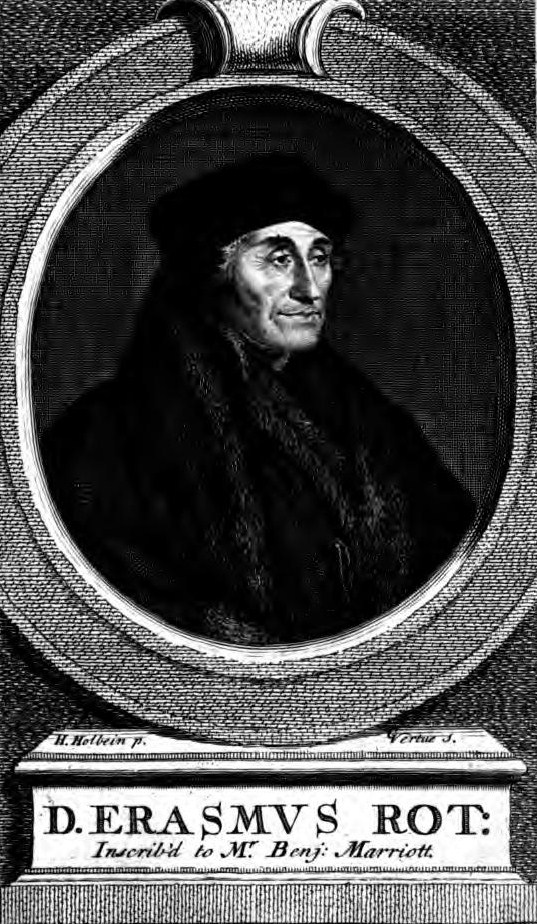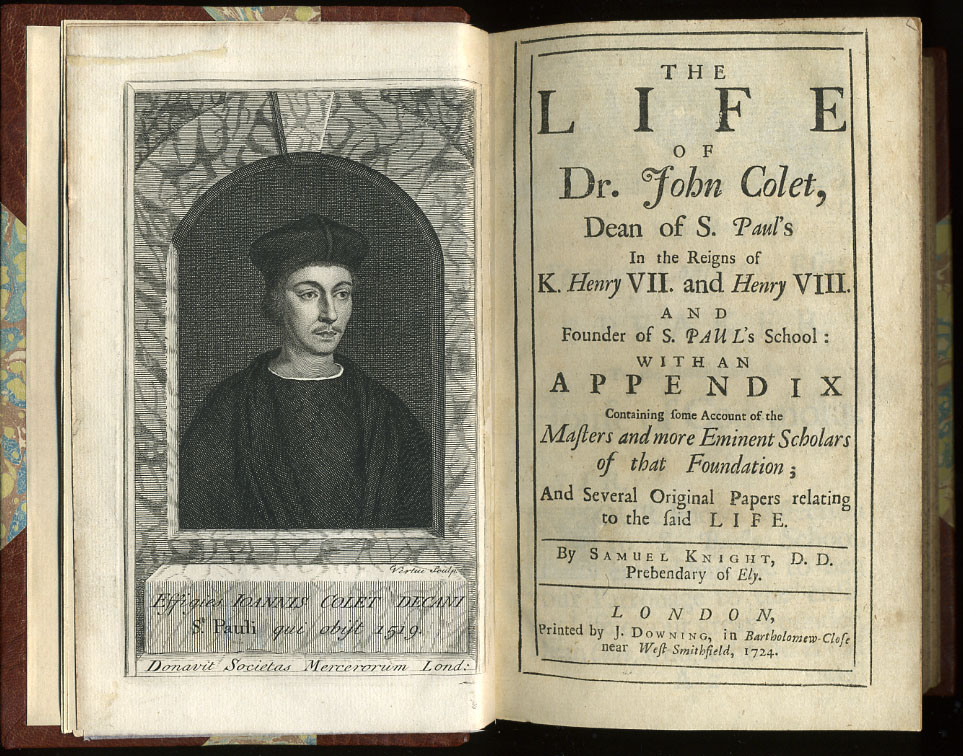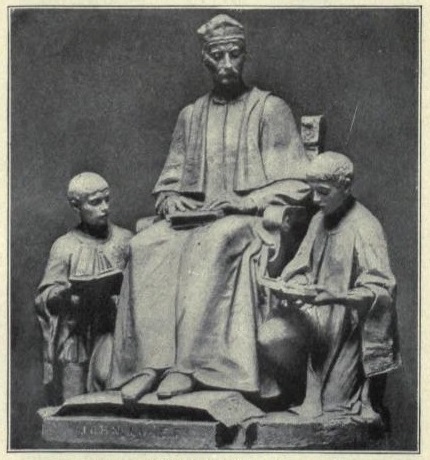|
Samuel Knight (priest)
Samuel Knight (1675–1746) was an English clergyman and antiquary. Life He was born in London the son of John Knight and attended St Paul's School, London and Trinity College, Cambridge (BA 1702, MA 1706), and received a Cambridge DD in 1706. He was ordained in 1704 and became chaplain to the Earl of Oxford. He was Rector of Borough Green, Cambridgeshire (1707-1746), Vicar of Chippenham, Cambridgeshire in 1707, Prebendary of Ely cathedral, (1714-1746) and Rector of Bluntisham, Huntingdonshire (1714-1746) . He served as chaplain to King George II from 1730 to 1746 and as Archdeacon of Berkshire from 1735 to 1746. He was a prebendary of Lincoln from 1742 to 1746 . Knight died on 9 December 1746 and was buried in Bluntisham Church. He had a son Samuel. Works He was a strong Protestant. In his biography of Erasmus, Knight argues, like many contemporary Protestants, that Erasmus was truly a Protestant at heart but did not fully express this during his lifetime. He focuses on Erasm ... [...More Info...] [...Related Items...] OR: [Wikipedia] [Google] [Baidu] |
St Paul's School, London
(''By Faith and By Learning'') , established = , closed = , type = Independent school Public school , religion = Church of England , president = , head_label = High Master , head = Sally Anne Huang , r_head_label = Surmaster , r_head = Fran Clough , chair_label = Chairman of the Governors , chair = Johnny Robertson , founder = John Colet , specialist = , address = Lonsdale Road , city = Barnes , county = London , country = United Kingdom , postcode = SW13 9JT , local_authority = , urn = 102942 , ofsted = , staff = c. 110 , enrolment = c.950 , gender = Boys ... [...More Info...] [...Related Items...] OR: [Wikipedia] [Google] [Baidu] |
Trinity College, Cambridge
Trinity College is a constituent college of the University of Cambridge. Founded in 1546 by Henry VIII, King Henry VIII, Trinity is one of the largest Cambridge colleges, with the largest financial endowment of any college at either Cambridge or University of Oxford, Oxford. Trinity has some of the most distinctive architecture in Cambridge with its Trinity Great Court, Great Court said to be the largest enclosed courtyard in Europe. Academically, Trinity performs exceptionally as measured by the Tompkins Table (the annual unofficial league table of Cambridge colleges), coming top from 2011 to 2017. Trinity was the top-performing college for the 2020-21 undergraduate exams, obtaining the highest percentage of good honours. Members of Trinity have been awarded 34 Nobel Prizes out of the 121 received by members of Cambridge University (the highest of any college at either Oxford or Cambridge). Members of the college have received four Fields Medals, one Turing Award and one Abel ... [...More Info...] [...Related Items...] OR: [Wikipedia] [Google] [Baidu] |
George II Of Great Britain
, house = Hanover , religion = Protestant , father = George I of Great Britain , mother = Sophia Dorothea of Celle , birth_date = 30 October / 9 November 1683 , birth_place = Herrenhausen Palace,Cannon. or Leine Palace, Hanover , death_date = , death_place = Kensington Palace, London, England , burial_date = 11 November 1760 , burial_place = Westminster Abbey, London , signature = Firma del Rey George II.svg , signature_alt = George's signature in cursive George II (George Augustus; german: link=no, Georg August; 30 October / 9 November 1683 – 25 October 1760) was King of Great Britain and Ireland, Duke of Brunswick-Lüneburg (Hanover) and a prince-elector of the Holy Roman Empire from 11 June 1727 ( O.S.) until his death in 1760. Born and brought up in northern Germany, George is the most recent British monarch born outside Great Britain. The Act of Settlement 1701 and the Acts of Union 1707 positioned his grandmother, ... [...More Info...] [...Related Items...] OR: [Wikipedia] [Google] [Baidu] |
Archdeacon Of Berkshire
The Archdeacon of Berkshire (also rendered Archdeacon of Berks) is a senior ecclesiastical officer in the Church of England Diocese of Oxford. The archdeacon is the head of the archdeaconry of Berkshire, a post historically found within the diocese of Salisbury, and then, from 7 October 1836, within Oxford diocese. List of archdeacons :''Some archdeacons without territorial titles are recorded from around the time of the Norman Conquest; see Archdeacon of Salisbury.'' High Medieval *–aft. 1156: Roger *bef. 1173–bef. 1205: Geoffrey de Vernun *bef. 1206–aft. 1215: Alberic *aft. 1204–aft. 1222: Geoffrey *bef. 1224–aft. 1236: William of Merton *: Clement *: William de Raley *bef. 1237–aft. 1255: Giles of Bridport *: William *bef. 1266–aft. 1268: Walter Scammel *bef. 1275–bef. May 1284: Stephen of Newbury *aft. June 1284–bef. 1313: William de Berges Late Medieval *10 March 1313–bef. December 1313: Richard de Bello *bef. December 1313–bef. August 1331 (d ... [...More Info...] [...Related Items...] OR: [Wikipedia] [Google] [Baidu] |
Erasmus Vertue
Desiderius Erasmus Roterodamus (; ; English: Erasmus of Rotterdam or Erasmus;''Erasmus'' was his baptismal name, given after St. Erasmus of Formiae. ''Desiderius'' was an adopted additional name, which he used from 1496. The ''Roterodamus'' was a scholarly name meaning "from Rotterdam", though the Latin genitive would be . 28 October 1466 – 12 July 1536) was a Dutch philosopher and Catholic theologian who is considered one of the greatest scholars of the northern Renaissance.Gleason, John B. "The Birth Dates of John Colet and Erasmus of Rotterdam: Fresh Documentary Evidence", Renaissance Quarterly, The University of Chicago Press on behalf of the Renaissance Society of America, Vol. 32, No. 1 (Spring, 1979), pp. 73–76www.jstor.org/ref> As a Catholic priest, he was an important figure in classical scholarship who wrote in a pure Latin style. Among humanists he was given the sobriquet "Prince of the Humanists", and has been called "the crowning glory of the Christian humanis ... [...More Info...] [...Related Items...] OR: [Wikipedia] [Google] [Baidu] |
Erasmus
Desiderius Erasmus Roterodamus (; ; English: Erasmus of Rotterdam or Erasmus;''Erasmus'' was his baptismal name, given after St. Erasmus of Formiae. ''Desiderius'' was an adopted additional name, which he used from 1496. The ''Roterodamus'' was a scholarly name meaning "from Rotterdam", though the Latin genitive would be . 28 October 1466 – 12 July 1536) was a Dutch philosopher and Catholic theologian who is considered one of the greatest scholars of the northern Renaissance.Gleason, John B. "The Birth Dates of John Colet and Erasmus of Rotterdam: Fresh Documentary Evidence", Renaissance Quarterly, The University of Chicago Press on behalf of the Renaissance Society of America, Vol. 32, No. 1 (Spring, 1979), pp. 73–76www.jstor.org/ref> As a Catholic priest, he was an important figure in classical scholarship who wrote in a pure Latin style. Among humanists he was given the sobriquet "Prince of the Humanists", and has been called "the crowning glory of the Christian humanists ... [...More Info...] [...Related Items...] OR: [Wikipedia] [Google] [Baidu] |
John Colet
John Colet (January 1467 – 16 September 1519) was an English Catholic priest and educational pioneer. John Colet was an English scholar, Renaissance humanist, theologian, member of the Worshipful Company of Mercers, and Dean of St Paul's Cathedral, London. Colet wanted people to see the scripture as their guide through life. Furthermore, he wanted to restore theology and rejuvenate Christianity. Colet is an important early leader of Christian humanism as he linked humanism and reform. John Colet was a friend of Erasmus, a key figure in Christian humanism. Childhood and education The eldest son of Sir Henry Colet (Lord Mayor of London 1486 and 1495), he was born in London in January 1467, and was educated at St Anthony's school and at Magdalen College, Oxford, where he took his M.A. in 1490. He was already nonresident rector of Dennington, Suffolk, and vicar of St Dunstan's, Stepney, and now became rector of Thurning, Hunts. In 1493 he went to Paris and then to Italy, studying ... [...More Info...] [...Related Items...] OR: [Wikipedia] [Google] [Baidu] |
Browne Willis
Browne Willis (16 September 1682 – 5 February 1760) was an antiquary, author, numismatist and politician who sat in the House of Commons from 1705 to 1708. Early life Willis was born at Blandford St Mary, Dorset, the eldest son of Thomas Willis of Bletchley, Buckinghamshire and his wife Alice Browne, daughter of Robert Browne of Frampton, Dorset. He was grandson of Dr Thomas Willis, the physician. He was educated at Bechampton School in the care of Abraham Freestone and at Westminster School. He attended Christ Church, Oxford and entered the Inner Temple in 1700. In 1707 he married Katherine Eliot, the daughter of Daniel Eliot. He joined the recently reformed Society of Antiquaries in 1717–18. Political career In 1705, Willis was elected Member of Parliament for Buckingham. He held the seat until 1708. Published works His published works are: * ''Notitia Parliamentaria'', vol. 1 (1715) * ''Survey of St David’s Cathedral'' (1716) * ''Notitia Parliamentaria'', vol. ... [...More Info...] [...Related Items...] OR: [Wikipedia] [Google] [Baidu] |
1675 Births
Events January–March * January 5 – Franco-Dutch War – Battle of Turckheim: The French defeat Austria and Brandenburg. * January 29 – John Sassamon, an English-educated Native American Christian, dies at Assawampsett Pond, an event which will trigger a year-long war between the English American colonists of New England, and the Algonquian Native American tribes. * February 4 – The Italian opera ''La divisione del mondo'', by Giovanni Legrenzi, is performed for the first time, premiering in Venice at the Teatro San Luca. The new opera, telling the story of the "division of the world" after the battle between the Gods of Olympus and the Titans, becomes known for its elaborate and expensive sets, machinery, and special effects and is revived 325 years later in the year 2000. * February 6 – Nicolò Sagredo is elected as the new Doge of Venice and leader of the Venetian Republic, replacing Domenico II Contarini, who had died 10 days ea ... [...More Info...] [...Related Items...] OR: [Wikipedia] [Google] [Baidu] |
1746 Deaths
Events January–March * January 8 – The Young Pretender Charles Edward Stuart occupies Stirling, Scotland. * January 17 – Battle of Falkirk Muir: British Government forces are defeated by Jacobite forces. * February 1 – Jagat Singh II, the ruler of the Mewar Kingdom, inaugurates his Lake Palace on the island of Jag Niwas in Lake Pichola, in what is now the state of Rajasthan in northwest India. * February 19 – Brussels, at the time part of the Austrian Netherlands, surrenders to France's Marshal Maurice de Saxe. * February 19 – Prince William, Duke of Cumberland, issues a proclamation offering an amnesty to participants in the Jacobite rebellion, directing them that they can avoid punishment if they turn their weapons in to their local Presbyterian church. * March 10 – Zakariya Khan Bahadur, the Mughal Empire's viceroy administering Lahore (in what is now Pakistan), orders the massacre of the city's Sikh people. April–Ju ... [...More Info...] [...Related Items...] OR: [Wikipedia] [Google] [Baidu] |
Archdeacons Of Berkshire
The Archdeacon of Berkshire (also rendered Archdeacon of Berks) is a senior ecclesiastical officer in the Church of England Diocese of Oxford. The archdeacon is the head of the archdeaconry of Berkshire, a post historically found within the diocese of Salisbury, and then, from 7 October 1836, within Oxford diocese. List of archdeacons :''Some archdeacons without territorial titles are recorded from around the time of the Norman Conquest; see Archdeacon of Salisbury.'' High Medieval *–aft. 1156: Roger *bef. 1173–bef. 1205: Geoffrey de Vernun *bef. 1206–aft. 1215: Alberic *aft. 1204–aft. 1222: Geoffrey *bef. 1224–aft. 1236: William of Merton *: Clement *: William de Raley *bef. 1237–aft. 1255: Giles of Bridport *: William *bef. 1266–aft. 1268: Walter Scammel *bef. 1275–bef. May 1284: Stephen of Newbury *aft. June 1284–bef. 1313: William de Berges Late Medieval *10 March 1313–bef. December 1313: Richard de Bello *bef. December 1313–bef. August 1331 (d ... [...More Info...] [...Related Items...] OR: [Wikipedia] [Google] [Baidu] |
English Antiquarians
English usually refers to: * English language * English people English may also refer to: Peoples, culture, and language * ''English'', an adjective for something of, from, or related to England ** English national identity, an identity and common culture ** English language in England, a variant of the English language spoken in England * English languages (other) * English studies, the study of English language and literature * ''English'', an Amish term for non-Amish, regardless of ethnicity Individuals * English (surname), a list of notable people with the surname ''English'' * People with the given name ** English McConnell (1882–1928), Irish footballer ** English Fisher (1928–2011), American boxing coach ** English Gardner (b. 1992), American track and field sprinter Places United States * English, Indiana, a town * English, Kentucky, an unincorporated community * English, Brazoria County, Texas, an unincorporated community * En ... [...More Info...] [...Related Items...] OR: [Wikipedia] [Google] [Baidu] |



_und_ihre_Kinder_Georg_August_und_Sophie_Dorothea.jpg)
.jpg)


